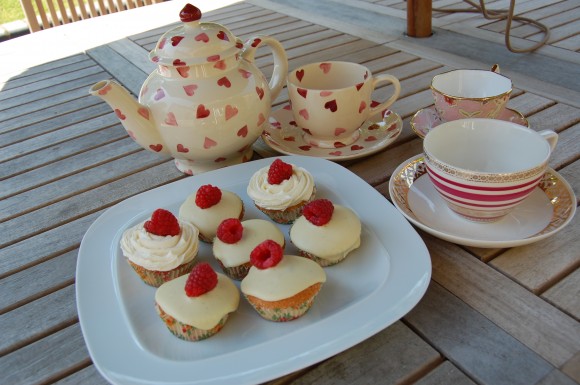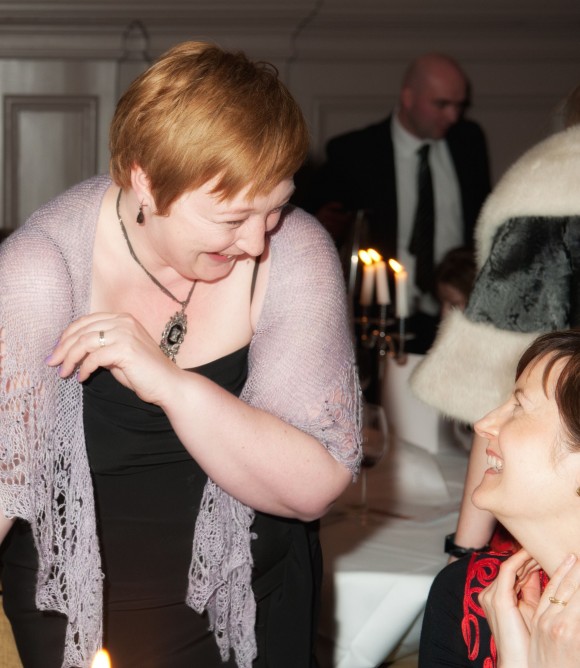Thrive
Stephanie Butland is a good laugh. She’s warm, funny, insightful, and is also responsible for the best cinnamon and white chocolate cupcakes I’ll ever encounter.
I quite fancy encountering those cakes right now, to be honest with you.

Stephanie’s better known for other things, however: for the blog-turned-book How I Said Bah! to Cancer, which takes a lot of that humour and insight, and turns it into a guide to ‘dancing with cancer’. Now in rude good health herself, she’s looking beyond the all-clear. I interviewed her about Thrive: the Bah! Guide to Wellness after Cancer, and I’d like some credit, please, for scrupulously avoiding any mention of cupcakes in the following questions:
Tell us about the book Thrive: the Bah! Guide to wellness after cancer is the book that I wrote when the medical profession was looking at me and saying ‘well, our work here is done’ and I felt like a wreck. Treatment for cancer is traumatic in a lot of ways, and getting from surviving it to being truly well is a journey in itself. So I wrote a book about the things that I was doing, or should have done, to get back to a true, balanced wellness. The book is similar to How I Said Bah! to Cancer in that it is a mix of personal experience, visualisation, thinking exercises, and practical strategies, along with advice for friends and family. Language is still very important, too. It has less needles and hair loss, though.
I get the sense you wrote Bah! To Cancer because there weren’t books out there which covered the subject in a creative enough way for you. Was the same true of Thrive? I don’t know that I think of Bah! or Thrive as being especially creative. It’s certainly true that I don’t think there are enough books that cover the very practical aspect of what to do with your brain during cancer and recovery. I was very struck during the Olympics by how unapologetically sportspeople talk about mental preparation, visualisation, and being in a good state of mind for their event.
I know you’re one of very few de Bono Master Trainers in the world. How has de Bono thinking influenced Thrive? What I’ve learned from de Bono is that if you change your thinking, everything changes. So the first thing I do with any problem is to stop and check whether the problem is actually my thinking. I think of it as, if I’m already barking up the wrong tree, barking louder ain’t going to help any. I got stuck on Thrive at an early stage and I realised that my original idea – to divide the book into body/mind/spirit/life sections – was the problem, rather than the mood I was in/the state of my studio/the concept of the book/my ability as a writer. So I asked myself how I could think about thriving differently. And as soon as I thought of it as a journey for the whole self, the book was as good as written. So although there isn’t anything that’s directly from de Bono in Thrive, de Bono’s central tenet of thinking as a separate (and teachable) skill is crucial to it. There are a lot of places in the book where I ask readers to examine their thinking before racing off in what could be the wrong direction.
What has most surprised you about your post-cancer life? I think it’s the fact that I don’t really think about cancer very much at all. Sometimes I meet people I haven’t seen in a while and they ask me how I am in that head-on-one-side-very-sincere way that people do when ‘How are you?’ doesn’t really completely express what you want to say and I have a moment where I am genuinely perplexed before I think ‘Oh! they’re thinking about the cancer!’ I do often feel a sort of non-specific sense of being lucky and blessed, though, so it’s obviously in my mind in some way.

Stephanie at this year’s 14/4 dinner. She made that beautiful shawl!
Do you think that having a life-threatening illness permanently changes the way people look at life? I’ve certainly met a lot of people who feel that way. And it’s not just illness: it’s anything that makes you truly, viscerally understand that you won’t be here forever – the death of a sibling, a nigh squeak on the motorway. It’s as though something needs to happen to us to make our brain move ‘one day I will die’ from the ‘hypothetical’ to the ‘yes, definitely gonna happen’ tray. And once that’s happened, I don’t think you can fail to live life differently. Although we all find out own way of making the most of it, I think that’s what we do.
If you were to distil one piece of wisdom (or Top Tip – or joke!) from the book, to pass on to people, what would it be? Jane Austen wrote, ‘Know your own happiness’, and I’d add ‘and seek it, and enjoy it, and accept it.’
Your next book will be fiction (the novel Surrounded by Water is out in 2014). I’m really interested in whether there was a link between Bah!, Thrive, and the desire to write a story. Although everything in Bah! and Thrive is true, it’s still the story of me that I’ve chosen to construct and share. A blow-by-blow account of it all would be rambling and difficult to follow and dull, with way too much information. And when I turned to my novel, I felt as though I was writing in a very similar way: in my mind, running through everything that I knew was happening to my characters, and choosing the bits to tell that would best serve the story. So I think it’s all the same thing: it’s all about storytelling, and if it wouldn’t send me straight to Pseud’s Corner I’d describe myself as a storyteller rather than a writer!
For what it’s worth, you’re not alone; I also think a lot about telling stories. It’s been a huge pleasure having you on the blog. Now, about those cakes…